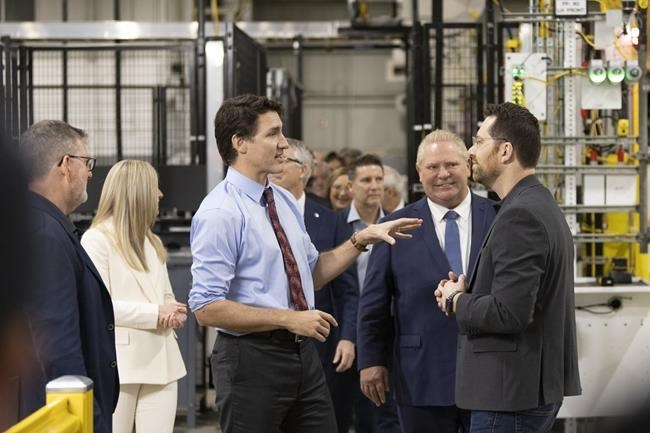WASHINGTON — Prime Minister Justin Trudeau said Monday that Canada will be "watching closely" as the United States responds to complaints from Europe about the North American protectionism built into President Joe Biden's signature climate change initiative.
Biden received an earful from French President Emmanuel Macron about "super aggressive" climate incentives in the Inflation Reduction Act — incentives that favour manufacturers in Canada and Mexico, as well as the U.S.
It wasn't always that way. Biden's original Build Back Better package included a tax credit scheme for electric vehicles that reserved the most generous incentives for U.S.-assembled EVs built with union labour.
That package fell apart, but its 11th-hour replacement — a kitchen-sink, pre-midterms effort framed as an inflation fighter — brought North American vehicles and critical minerals into the fold, thanks in part to concerted Canadian lobbying.
Now, Europe is complaining about the very aspects of the law that prompted sighs of relief from north of the border, and Biden has acknowledged "glitches" that he insisted last week were never meant to alienate allies.
"It's something we're watching closely and we're engaged with our European counterparts, as well as our American counterparts, to make sure that we're working together," Trudeau told a news conference Monday.
He was with Ontario Premier Doug Ford in Ingersoll, Ont., to celebrate the launch of Canada's first full-scale commercial EV plant, a GM Canada facility that's on tap to build 50,000 electric delivery vans a year by 2025.
Whatever steps the Biden administration ends up taking to placate other disgruntled allies, Canada's auto sector isn't afraid of a little friendly competition, Trudeau suggested.
"We have a free trade deal with Europe that we signed a few years ago … which is an advantage Canada has over the United States when it comes to accessing the European market," he said.
"We're always going to focus on remaining competitive. We're always going to focus on making sure that we can sell not just into the United States, and manufacture here in Canada for the United States, but also for partners around the world."
With Macron at his side, Biden last week characterized one of the most important aspects of the law for Canada — content requirements for critical minerals that favour countries with a free trade agreement with the U.S. — as an error.
"He didn't mean, literally, 'free trade agreement,'" Biden said, an apparent reference to Sen. Joe Manchin, the West Virginia swing-vote Democrat who successfully retooled the legislation with Senate Majority Leader Chuck Schumer.
"It was never intended, when I wrote the legislation, to exclude folks who were co-operating with us. That was not the intention."
And yet that was exactly what happened with the original iteration of the bill, Biden's doomed Build Back Better legislation, which triggered an all-hands effort from business leaders, provinces and Ottawa to convince the U.S. it would be shooting itself in the foot, economically speaking.
"Our only objective was the make sure that we didn't get excluded," said Flavio Volpe, president of the Automotive Parts Manufacturers' Association, who spent much of the last year in D.C. to help make Canada's case.
"If it includes everybody else, well, we compete with everybody else anyway."
Volpe called it a bonus — "maybe an accidental bonus" — that for the moment, the law only includes the U.S., Canada and Mexico. But that was never the ultimate intent, he said.
"To be frank, the threat was that if it was only American, we were in big trouble, because we sell 80 per cent of the cars we make to those consumers."
Monday also happened to mark the third meeting of the Trade and Technology Council of the U.S. and the European Union, a coalition of senior leaders tasked by Biden back in 2021 with fostering their own bilateral trade ties.
U.S. Secretary of State Antony Blinken, who co-chairs the council, made it clear that Europe's concerns about the Inflation Reduction Act were top of mind during the group's meeting in Maryland.
"I think we advanced that discussion," said Blinken, noting that the group talked about electric and commercial vehicle tax credits, critical minerals and supply chains.
The U.S. and the EU have already established a task force to explore possible solutions, with Biden's own public comments helping to ramp up the urgency of those talks, he added.
"We are committed to moving forward together — not at the expense of each other, but to the benefit of each other."
Margrethe Vestager, executive vice-president of the European Commission and one of Blinken's co-chairs, acknowledged that sense of urgency, noting that Europe, too, has its own work to do to improve its environmental bona fides.
"The most important thing is probably that the U.S. is fully engaged in fighting climate change," Vestager said.
"We can solve the things that are of concern — we have showed that before, we'll show that again — but the most important message I think for everyone is that we're together in what is needed to fight climate change."
This report by The Canadian Press was first published Dec. 5, 2022.
James McCarten, The Canadian Press


